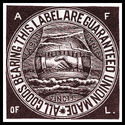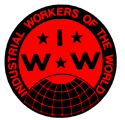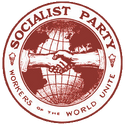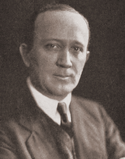The Combined Syndicates of America (CSA) is a coalition of American labor unions and socialist political parties based on the principles of syndicalism and socialism. Formed out of the Industrial Workers of the World (IWW) and the American Federation of Labor (AFL), it seeks to coordinate union activity and policy for the purpose of bringing about a syndicalist revolution in the United States. Although officially led by General Secretary William “Big Bill” Haywood, his declining health has led New York Senator Jack Reed to assume many of his responsibilities. The CSA officially supports the Socialist Party of America (SPA) for its electoral operations.
History[]

Seal of the AFL with the latin motto labor omnia vincit ("work conquers all").
American Federation of Labor[]
The American Federation of Labor (AFL) is a national federation of labor unions founded in Columbus, Ohio on 8 December 1886 that originally emerged from a dispute with the now-defunct Knights of Labor. Dominated by union leader Samuel Gompers until his death in 1924, it was the largest grouping of unions in the United States until the creation of the CSA. The AFL was established by craft unions, a model of trade unionism in which workers are organized based on the particular trade or craft which they work (i.e. skilled vs. unskilled laborers).
From its inception, the AFL has focused on achieving a minimum wage and protections from scab workers (the so-called “dignity of labor” program). The AFL’s guiding principle, "pure and simple trade unionism", can be summarized with its slogan "a fair day's pay for a fair day's work". This fundamentally conservative approach limits the AFL to matters pertaining to wages and working conditions, relegating political goals to its allies in the political sphere. It is vigorously opposed to unrestricted immigration from Europe out of fear that an influx of new workers would flood the labor market and lower wages.
Despite the AFL’s business-friendly modus operandi, membership began to decline at the turn of the twentieth century in the face of a large business-backed open shop campaign. In 1906 the AFL adopted a new political policy of “rewarding friends and punishing enemies” at the ballot box, becoming increasingly aligned with the Democratic Party. Membership continued to dwindle during the 1920s as the AFL struggled to respond to the successful syndicalist revolutions in Western Europe.

Logo of the IWW.
Industrial Workers of the World[]
The Industrial Workers of the World (IWW) is a revolutionary industrial labor union founded in Chicago, Illinois on 27 June 1905 that emerged out of opposition to the AFL’s acceptance of capitalism and its refusal to admit unskilled workers into craft unions. Aiming to promote worker solidarity in the struggle to overthrow the employer class, its motto is “an injury to one is an injury to all” and its members are known as “Wobblies”. In contrast to the AFL, the IWW is organized as an industrial union, a model of trade unionism in which all workers in one industry are organized into the same union regardless of skill or craft.
The IWW promotes direct action in the form of sabotage, strikes, propaganda, and boycotts to accomplish its goals as opposed to political action in the form of electoral politics. It emphasizes rank-and-file organization as opposed to empowering leaders to bargain with employers on behalf of workers. One of the IWW's most important contributions to the labor movement and broader push towards social justice was that, when founded, it was the only American union to welcome all workers, including women, immigrants, and people of all races, into the same organization.
In the 1910s and early 1920s, the IWW achieved many of its short-term goals, particularly in the American West, and cut across traditional guild and union lines to organize workers in a variety of trades and industries. The IWW was instrumental in promoting the concept of "One Big Union", and as such, became the bulk around which the CSA was formed.

Logo of the SPA.
Socialist Party of America[]
The Socialist Party of America (SPA) is a socialist political party in the United States founded in Indianapolis, Indiana on 29 July 1901 by a merger between the Social Democratic Party of America (SDP) and disaffected elements of the Socialist Labor Party of America (SLP). The SPA’s voting strength is greatest in the Midwest and Great Lakes region, colloquially termed the Red Belt.
Early political perspectives in the party ranged from radical socialism to social democracy, with New York party leader Morris Hillquit and Wisconsin Congressman Victor L. Berger on the right-wing, and union leaders Bill Haywood and Eugene V. Debs on the left-wing. There were also agrarian utopian-leaning radicals, such as Julius Wayland of Kansas, along with trade unionists; Jewish, Finnish, and German immigrants; and intellectuals such as Walter Lippmann and Hubert Harrison. At its founding convention, a resolution was passed in favor of "equal rights for all human beings without distinction of color, race or sex", specifically highlighting African Americans as particularly oppressed and exploited and calling for them to be organized by the socialist and labor movements.
The relationship of the SPA to both the IWW and AFL was the subject of frequent intra-party conflict throughout the 1900s and 1910s. AFL leadership was strongly opposed to the Socialist Party, but many rank and file union members within the AFL saw the socialists as reliable political allies. Moderates within the SPA, such as Berger, urged cooperation with the AFL and its member unions, while more radical members, such as Debs, dismissed the AFL and its craft unions as antiquated and irrelevant, preferring instead the more radical IWW and its syndicalist path to socialism. In 1911 Haywood was elected to serve on the National Executive Committee (NEC) of the SPA. However, the aggressive direct action tactics of Haywood and the IWW soon brought him into conflict with the moderate, electorally-oriented leaders of the SPA. After Haywood was quoted at public meetings in New York City as saying he favored direct action over electoral politics, an initiative recalling him from the NEC was launched that succeeded by a margin of over 2-to-1. Following his defeat, Haywood left the ranks of the SPA, joined by thousands of other IWW members and sympathizers.
Following the 1919 elections, the NEC came under the control of the left-wing of the party for the first time, with notable radical members such as Alfred Wagenknecht, Benjamin Gitlow, C.E. Ruthenberg, William Bross Lloyd, and John Reed elected to serve on the Committee. An Emergency National Congress was convened shortly before the 1920 May Day celebration to address both the failed communist revolution in Russia and the successful syndicalist revolution in France. Intense debate over whether or not to support the new Communard government lasted for nearly an hour, with Gitlow arguing in favor and Ruthenburg arguing in opposition. Ultimately, a compelling speech by Reed and rare intra-party dispute appearance from Debs led the party to vote not only to support the syndicalist revolution in France, but also to rescind the 1911 expulsions and amendments condemning direct action, welcoming Haywood and the IWW back into the fold of the SPA.
1925 Philadelphia Pan-Union Congress[]
On 12 July 1925 a special Pan-Union Congress was called in Philadelphia, Pennsylvania featuring delegates from both the IWW and the AFL. At the Congress, Reed and several other leaders of the IWW presented a plan for the creation of a large umbrella organization designed to coordinate union activity and policy for the purpose of bringing about a syndicalist revolution in the United States, tentatively named the Combined Syndicates of America. Although the plan was met with general approval by the assembled delegates, several representatives from some of the constituent unions of the AFL objected to the stated goal of revolution. Reed formulated a compromise whereby the anti-revolution unions would be organized into a uniquely autonomous branch of the CSA headed by Norman Thomas, a Presbytyrian minister and anti-war activist.
Political Activities[]
Social Welfare[]
Uniting various shades of socialist, syndicalist, and communist opinion, the CSA has mobilized millions of workers within America’s industrial heartland. With the onset of the Great Depression, the CSA has organized a social welfare program called International Red Aid to provide for struggling workers and their families.
Paramilitarism[]
The Red Guard are a decentralized paramilitary militia dedicated to fighting for the syndicalist revolution on the streets, and are inspired by the 1917 Finnish militia of the same name. They are frequently involved in clashes with the Minutemen and Silver Legion in the south, and are officially labeled a domestic security threat by the Bureau of Investigation as well as the United States Military.
Key individuals[]
Due to the nature of the organization, there are various factions within the CSA that have differing interpretations of socialism and syndicalism. These individuals have all dedicated themselves to voting for the SPA in the upcoming elections and supporting an eventual syndicalist revolution in the United States.
| Name | Photo | Position | Description |
|---|---|---|---|
| William "Big Bill" Haywood | General Secretary of the Combined Syndicates | Radical labor organizer and founding member of the IWW. Due to ill health, his duties are currently undertaken by Senator Reed. | |
| Norman Thomas | Secretary of Internationalist Section | Former Presbyterian minister and anti-war activist. Was the SPA's nominee in the 1928 presidential elections. | |
| Elizabeth Gurley Flynn | Secretary of Orthodox Syndicalist Section | Prominent feminist and founding member of the American Civil Liberties Union (ACLU). | |
| William Z. Foster | Secretary of Totalist Section | Proposes centralization and state control of the economy in line with the new totalist charter. Runs the Trade Union Unity League (TUUL), a totalist clique within the AFL. | |
| Earl Browder | Secretary of Vanguardist Section | Rival to Foster, opposes the structure of the totalist charter. Advocates centralizing the Red Guard into a formal "vanguard of the working class". |





